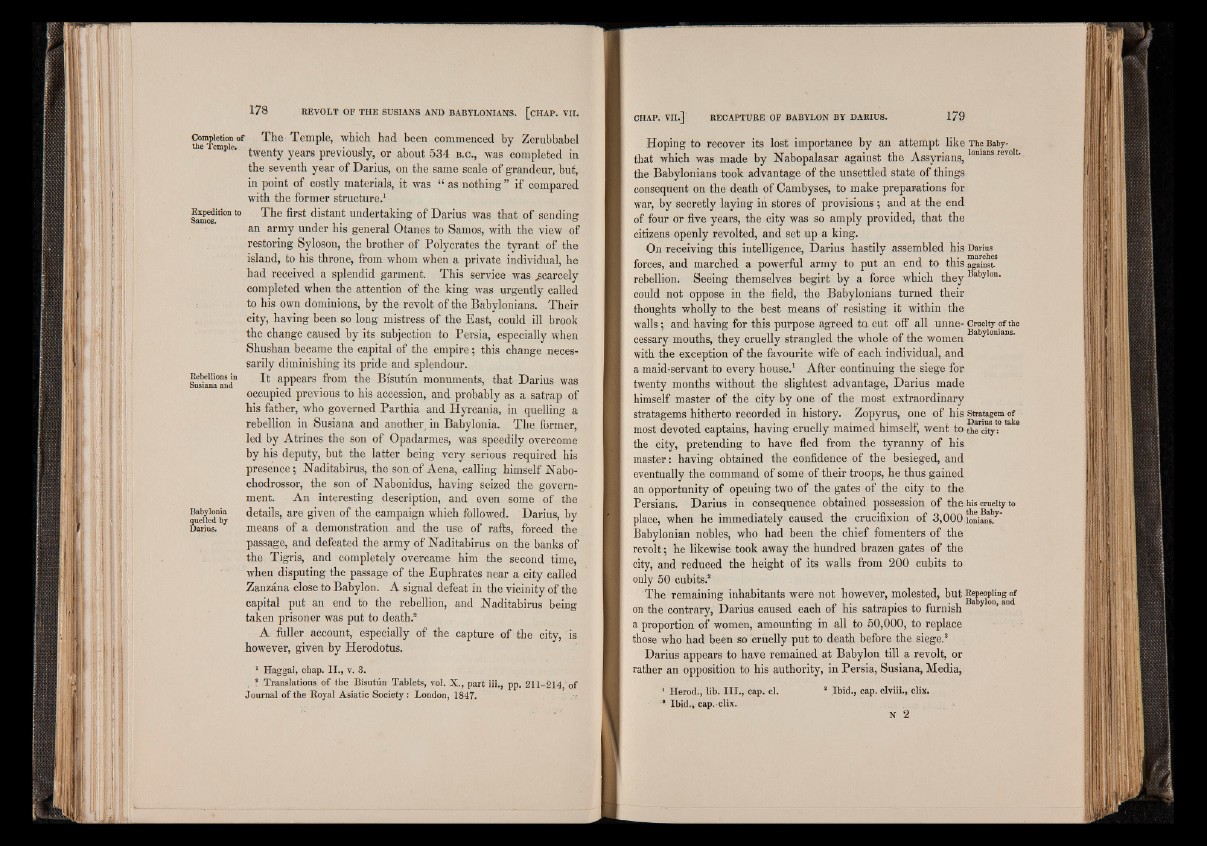
Completion of The Temple, which had been commenced by Zerubbabel
e empie, tw e n t y years previously, or about 534 B.C., was completed in
the seventh year of Darius, on the same scale of grandeur, but,
in point of costly materials, it was “ as nothing ” if compared
with the former structure.1
Expedition to The first distant undertaking of Darius was that of sending
an army under his general Otanes to Samos, with the view of
restoring Syloson, the brother of Polycrates the tyrant of the
island, to his throne, from whom when a private individual, he
had received a splendid garment. This service was .scarcely
completed when the attention of the king was urgently called
to his own dominions, by the revolt of the Babylonians. Their
city, having been so long mistress of the East, could ill brook
the change caused by its subjection to Persia, especially when
Shushan became the capital of the empire; this change necessarily
diminishing its pride and splendour.
It appears from the Bisutun monuments, that Darius was
occupied previous to his accession, and probably as a satrap of
his father, who governed Parthia and Hyrcania, in quelling a
rebellion in Susiana and another, in Babylonia. The former,
led by Atrines the son of Opadarmes, was speedily overcome
by his deputy, but the latter being very serious required his;
presence; Naditabirus, the son of Aena, calling himself Nabo-
chodrossor, the son of Nabonidus, having seized the government.
An interesting description, and even some of the
queiiedby details, are given of the campaign which followed. Darius, by
Darius. means of a demonstration and the use of rafts, forced the
passage, and defeated the army of Naditabirus on the banks of
the Tigris, and completely overcame him the second time,
when disputing the passage of the Euphrates near a city called
Zanzana close to Babylon. A signal defeat in the vicinity of the
capital put an end to the rebellion, and Naditabirus being
taken prisoner was put to death.2
A fuller account, especially of the capture of the city, is
however, given by Herodotus.
1 Haggai, chap. I I ., v. 3.
8 Translations of the Bisutun Tablets, vol. X., part iii., pp. 211-214 of
Journal of the Royal Asiatic Society: London, 1847.
Hoping to recover its lost importance by an attempt like The Baby-
that which was made by Nabopalasar against the Assyrians,lomans reT01-
the Babylonians took advantage of the unsettled state of things
consequent on the death of Cambyses, to make preparations for
war, by secretly laying in stores of provisions ; and at the end
of four or five years, the city was so amply provided, that the
citizens openly revolted, and set up a king.
On receiving this intelligence, Darius hastily assembled his Darius
__ marches forces, and marched a powerful army to put an end to this against,
rebellion. Seeing themselves begirt by a force which theyBabyllm'
could not oppose in the field, the Babylonians turned their
thoughts wholly to the best means of resisting it within the
walls; and having for this purpose agreed ta cut off all unne- Cruelty of the
cessary mouths, they cruelly strangled the whole of the women abylomans'
with the exception of the favourite wife of each individual, and
a maid-servant to every house.1 After continuing the siege for
twenty months without the slightest advantage, Darius made
himself master of the city by one of the most extraordinary
stratagems hitherto recorded in history. Zopyrus, one of his stratagem of
most devoted captains, having cruelly maimed himself, went to the city:
the city, pretending to have fled from the tyranny of his
master: having obtained the confidence of the besieged, and
eventually the command of some of their troops, he thus gained
an opportunity of opening two of the gates of the city to the
Persians. Darius in consequence obtained possession of the his cruelty to
place, when he immediately caused the crucifixion of 3,000 ioniana!y
Babylonian nobles, who had been the chief fomenters of the
revolt; he likewise took away the hundred brazen gates of the
city, and reduced the height of its walls from 200 cubits to
only 50 cubits.8
The remaining inhabitants were not however, molested, but ^p eo p lin g of
on the contrary, Darius caused each of his satrapies to furnish
a proportion of women, amounting in all to 50,000, to replace
those who had been so cruelly put to death before the siege.3
Darius appears to have remained at Babylon till a revolt, or
rather an opposition to his authority, in Persia, Susiana, Media,
1 Herod., lib. I I I ., cap. cl. 8 Ibid., cap. clviii., clix.
8 Ibid., cap. clix.
N 2